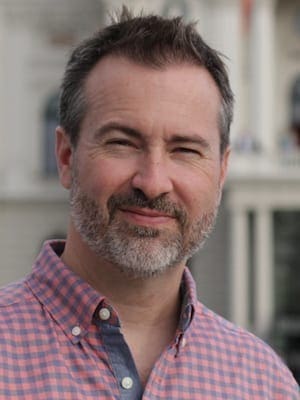I’ve been making documentaries for EthicsDaily.com for the last five years. The projects have all focused on theology and social justice. They have been screened in churches, seminaries, community groups, national conferences, film festivals and living rooms on DVD, TV and the Web.
I have traveled the country with Robert Parham, EthicsDaily.com’s executive editor and co-producer of these documentaries. We do everything in-house: pre-production, shooting, editing, DVD authoring, etc. (the exception being final mixes for broadcast TV).
Dozens of interviews and location shoots have amounted to several hundred hours of footage. I’ve catalogued countless comments from Christians, Jews and Muslims on issues including racism, hunger, poverty, faith and politics, taxation, interfaith relations and more.
Each project is unique, but these common-good documentaries share the primacy of interpreting how sacred texts call their followers to pursue justice.
Below, lessons I’ve learned along the way.
1. Forget your Sunday school teachers. Sort of. Prepare to hear unfamiliar interpretations of your own sacred text. This will likely be especially true if your interviewees don’t share your age, race, ethnicity, nationality, gender, denomination and so forth. One of the reasons I got into documentaries was to learn something, so this part of the process challenges and rewards. I say forget your Sunday school teachers sort of because remembering what you were taught will help you present different interpretations to others.
2. Watch what you cut. Most films, fiction or non, have their final “rewrite” in the editing suite. So in editing interviews, it’s important not to inadvertently make folks say something they didn’t intend to. Or in the case of a theological talking point – make them say something they don’t believe.
3. Stay away from sex. On a bookshelf behind one interviewee years ago was a book about women. It had “sex” in the title. Leave it to church folk to find the word “sex” in a shot containing shelves of book spines, not to mention an articulate interviewee. The point: Identify potential distractions in all your shots and take time to minimize them.
4. Find good people. Our documentaries rely to a great extent on the commentary and insights of our interviewees. It’s critical we find folks who ideally combine energy, knowledge, grace, experience and storytelling skills to offer valuable comments. On camera. To strangers. On volatile topics. With relatively little time.
5. Brace for criticism. We believe sacred texts call out the better angels in some people – but in others, not so much. Others will use the texts as blunt instruments on those who dare offer an interpretation different from their own. You, your faith, your organization and your associates will be attacked.
6. Use your manners. Thank interviewees who give their time, energy and reputation to your project. Acknowledge custodians who unlock doors and point out power outlets. Respect places of worship.
7. Ask for a story. Everyone loves a good story. And don’t underestimate how anyone – from the average person in the pew to the most learned of theologians – will filter Scripture through personal experience.
8. Shoot the steeple. Get footage of the building, be it church, synagogue or mosque. Ask for permission, roam the grounds, shoot inside and outside. Notice the particularities and roll on the angel, prayer times and menorah. Doing this develops an appreciation for the local congregation, forces one to pay attention to unique religious practices, and provides more of the necessary supporting visuals.
9. Handle with care. This applies to everyone and everything: interviewees, topic, texts, equipment. Each of these is too fragile to treat carelessly.
10. Fear not. There’s a difference between being careful and being fearful. The theology-drenched social justice documentary requires care and shuns fear. It shuns fear because the option of inaction really isn’t one. Remember: “If’n you’re skeered, you can’t do it.”
Documentary filmmaking historically has been a tool for social change. As the nonfiction genres expand in the 21st century, we hope projects like ours – which feature sacred texts and those who live by them – will continue to advance the common good.
Cliff Vaughn is managing editor and media producer for EthicsDaily.com.
Click here to learn more about EthicsDaily.com’s documentaries, including the award-winning “Beneath the Skin” as well as “Different Books, Common Word,” which aired on ABC-TV stations earlier this year.

